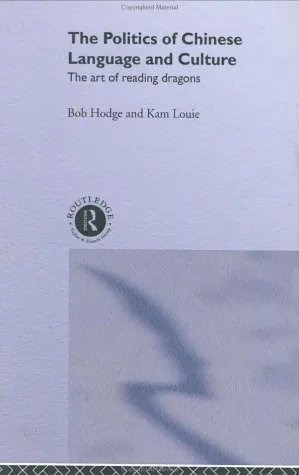The Politics of Chinese Language and Culture: The Art of Reading Dragons (Culture and Communication in Asia)
4.5
بر اساس نظر کاربران

شما میتونید سوالاتتون در باره کتاب رو از هوش مصنوعیش بعد از ورود بپرسید
هر دانلود یا پرسش از هوش مصنوعی 2 امتیاز لازم دارد، برای بدست آوردن امتیاز رایگان، به صفحه ی راهنمای امتیازات سر بزنید و یک سری کار ارزشمند انجام بدینمقدمهای بر کتاب 'The Politics of Chinese Language and Culture: The Art of Reading Dragons'
کتاب 'The Politics of Chinese Language and Culture: The Art of Reading Dragons' نوشته باب هاج، به عنوان یکی از آثار برجسته در مطالعه زبان و فرهنگ چینی، به تحلیل پیچیدگیهای زبان چینی و نقشی که در سیاست و فرهنگ این کشور بازی میکند، میپردازد. این کتاب نه تنها به بررسی ساختار زبان چینی میپردازد، بلکه نحوه تعامل آن با فرهنگ و سیاست را نیز بازتاب میدهد.
خلاصه کتاب
نویسنده در این کتاب به بررسی طبیعت عمیقاً سیاسی و فرهنگی زبان چینی میپردازد. او به تحلیل چگونگی بهرهبرداری قدرتهای سیاسی از زبان به عنوان ابزاری برای کنترل اجتماعی میپردازد. از دوران امپراتوری تا انجمنهای مدرن، زبان چینی همواره به عنوان وسیلهای برای ایجاد هماهنگی اجتماعی و اعمال قدرت مورد استفاده قرار گرفته است. هاج به شکلی بینظیر چگونگی پیچیدگیهای زبانی مانند ایدئوگرامها و تنوع لهجهها را بررسی میکند و اینکه این ویژگیها چگونه در سیاست نفوذ میکنند، بحث میکند.
نکات کلیدی
- تأثیر زبان بر سیاست و فرهنگ چین و چگونگی ارتباط این دو با هم
- نقش زبان در ایجاد و حفظ تمایزات فرهنگی و سیاسی
- تحلیل ساختارهای زبانی مانند ایدئوگرامها و تأثیر آنها بر درک ما از جامعه چینی
- چگونگی استفاده از زبان به عنوان ابزار قدرت و کنترل اجتماعی در طول تاریخ چین
نقلقولهای معروف از کتاب
«زبان چینی چیزی فراتر از وسیلهای برای ارتباط است؛ این زبان یک میراث فرهنگی و یک ابزار سیاسی است که در دست نخبگان قرار دارد.»
«ایدئوگرامها نه تنها واحدی از زبان هستند بلکه نشانهای از پیچیدگی جامعهای که از آنها استفاده میکند، نیز میباشند.»
چرا این کتاب مهم است؟
این کتاب اهمیت ویژهای برای دانشجویان زبان و فرهنگ چین و حتی برای علاقهمندان به سیاست جهانی دارد. با کاوش در روابط پیچیده بین زبان و قدرت، هاج ما را به درکی عمیقتر از چگونگی استفاده از زبان به عنوان ابزاری برای قدرتطلبی و نفوذ فرهنگی هدایت میکند. با تحلیل دقیق از زبان چینی، کتاب به خوانندگان فرصت میدهد تا به بازنگری در نقش زبان در دیگر فرهنگها و سیاستهای دیگر ملل بپردازند.
The Politics of Chinese Language and Culture: The Art of Reading Dragons
In "The Politics of Chinese Language and Culture: The Art of Reading Dragons," we delve into the intricate dance between language and cultural identity within the complex tapestry of Chinese society. This book explores the symbolic power of language as a tool not just for communication, but as a political instrument that shapes and is shaped by cultural dynamics, historical contexts, and societal change.
Detailed Summary of the Book
As the title suggests, this book is an exploration into the 'art' of interpreting Chinese linguistic and cultural symbols, drawing parallels with the mythical 'dragons' that symbolize both challenge and opportunity within Chinese narratives. The book begins by establishing a foundational understanding of the centrality of language within Chinese culture, tracing back to ancient times where language not only communicated ideas but also served as a medium of power and identity formation.
Throughout its chapters, the book tackles various dimensions of the Chinese language—from its evolution and structure to its role in political discourse and cultural expression. It highlights how language policies and reforms have been employed by successive regimes to shape national identity and control information. Additionally, the text uncovers the interplay between language and social stratification, examining how dialects can reinforce or diminish regional pride and socio-political alignment.
By invoking 'dragons,' the book emphasizes the dynamic and sometimes contentious interactions between language, power, and culture. A detailed analysis is provided on how cultural symbols and language are used to maintain governance, influence public opinion, and assert regional dominance, with direct implications for international relations and cultural diplomacy.
Key Takeaways
- Understanding the historical context of Chinese language reforms
- The relationship between language, identity, and politics in China
- Insights into the role of language as a tool of political control and cultural cohesion
- The significance of dialects and regional languages in socio-political contexts
- Implications of language politics on international relations, especially with Western cultures
Famous Quotes from the Book
"Language is not just a medium of expression but a battleground for cultural sovereignty."
"To read a dragon is to understand the narrative of a civilization."
Why This Book Matters
In modern global interactions, understanding the underpinnings of communication and culture within any context is crucial, and nowhere is this more true than in the context of China—a nation deeply rooted in its rich historical discourse and rapidly transforming in the global arena. This book provides invaluable insights into the political dimensions of language and culture in China, showcasing the nuances that are often overlooked by conventional analyses.
Academics, cultural analysts, policy makers, and anyone with a keen interest in Chinese studies will find this book a crucial resource. It challenges readers to see beyond the surface of language as a mere tool of communication, instead appreciating it as a powerful agent in shaping ideologies and institutions.
دانلود رایگان مستقیم
You Can Download this book after Login
دسترسی به کتابها از طریق پلتفرمهای قانونی و کتابخانههای عمومی نه تنها از حقوق نویسندگان و ناشران حمایت میکند، بلکه به پایداری فرهنگ کتابخوانی نیز کمک میرساند. پیش از دانلود، لحظهای به بررسی این گزینهها فکر کنید.
این کتاب رو در پلتفرم های دیگه ببینید
WorldCat به شما کمک میکنه تا کتاب ها رو در کتابخانه های سراسر دنیا پیدا کنید
امتیازها، نظرات تخصصی و صحبت ها درباره کتاب را در Goodreads ببینید
کتابهای کمیاب یا دست دوم را در AbeBooks پیدا کنید و بخرید


